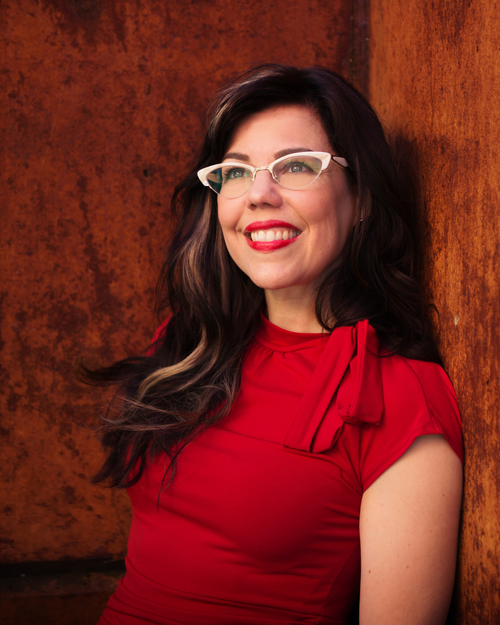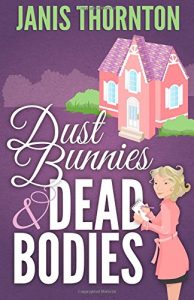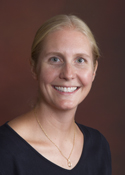 Martha Brockenbrough (rhymes with broken toe) is the author of two books for adults and five books for young readers. She’s the founder of National Grammar Day (every March 4), and she’s written game questions for Cranium and Trivial Pursuit. The former editor of MSN.com, Martha has interviewed lots of celebrities, including the Jonas Brothers and Slash (his favorite dinosaur is the diplodocus). Her work has been published in a variety of places, including The New York Times. She also wrote an educational humor column for the online encyclopedia Encarta for nine years. Her debut novel Devine Intervention, was one of Kirkus Reviews Top 100 books for teens in 2012, and was a Kansas State Reading Circle selection. Her books include the middle grade nonfiction opus Finding Bigfoot, and a picture book called The Dinosaur Tooth Fairy. Her YA novel The Game of Love and Death was released April 2015 by Scholastic. Martha has taught writing for children at the University of Washington continuing education program and elsewhere. She lives in Seattle with her family.
Martha Brockenbrough (rhymes with broken toe) is the author of two books for adults and five books for young readers. She’s the founder of National Grammar Day (every March 4), and she’s written game questions for Cranium and Trivial Pursuit. The former editor of MSN.com, Martha has interviewed lots of celebrities, including the Jonas Brothers and Slash (his favorite dinosaur is the diplodocus). Her work has been published in a variety of places, including The New York Times. She also wrote an educational humor column for the online encyclopedia Encarta for nine years. Her debut novel Devine Intervention, was one of Kirkus Reviews Top 100 books for teens in 2012, and was a Kansas State Reading Circle selection. Her books include the middle grade nonfiction opus Finding Bigfoot, and a picture book called The Dinosaur Tooth Fairy. Her YA novel The Game of Love and Death was released April 2015 by Scholastic. Martha has taught writing for children at the University of Washington continuing education program and elsewhere. She lives in Seattle with her family.
An L.A Times reviewer said about Devine Intervention: “It is a pleasure to read a writer who so delights in language, and who writes so captivatingly in a teen voice with such imaginative description.”
Kirkus reviews: “The rules governing Jerome’s afterlife lead to frequently hysterical prose…. Beneath the snark, though, runs a current of devastatingly honest writing that surprises with its occasional beauty and hits home with the keenness of its insight.”
And Booklist gave a starred review for The Game of Love, released in April. “This original novel is a thoughtful exploration of courage, love, and the price we pay to live.”
MWW committee member Cathy Shouse interviewed Martha for our E-pistle e-newletter issue.
MWW: Please tell us something about your background, how you became a novelist, and perhaps enlighten us on what an “educational humor column” is.
MB: I was one of five kids, and always sort of the odd one out. My brothers and sisters were matched pairs, and I spent a lot of my time putting my cat in baby clothes and carrying him around in a basket, and when he’d had enough of the indignity, I’d read. I loved reading, and once I realized that there were new books being written by people who were not yet dead, I began to consider it seriously as a career. I was 8 at the time, though, and didn’t know where to start. I read voraciously, though, and often reread the same books until I’d memorized passages and their page numbers. Little did I know I was teaching myself how to put together pleasing sentences and paragraphs (plot and structure came later for me and were harder to achieve). I had a number of other careers before becoming a writer: teacher, journalist, web producer, game question writer. The educational humor column, which I wrote for the online encyclopedia Encarta, was my first regular freelance job. It was so much fun–I could write about anything that interested me, and my goal was to interest readers enough to pursue more information on the subject. I wrote about bigfoot, grammar, secret societies, the influence of names, happiness … a lot of what I learned doing that column for nine years still informs my writing and my life. I also believe that writers of fiction would benefit greatly by reading a lot of nonfiction. The more of the world we can draw into our stories, the richer they will be.
MWW: You have received glowing reviews of your work that many of us would dream of getting. Does such acclaim influence your writing? If so, how?
MB: The thing with reviews is that they come after your work is done and after you have spent a lot of time with your agent, your brilliant editor, his team of assistants and copy editors and proof readers, the book designers and illustrators and marketers and sales people….
All of these things shape reviews, particularly the hands-on work of your editor, which is why I am fortunate to work with one of the masters. Great reviews tend to come when everyone on the team has pulled out all of the stops. That said, not every book is for every reader, and there is a lot of luck that comes into it. Did your book fall into the hands of someone who was ready for it at that time? That matters, too. What I’m saying here is that reviews are about a lot of things and not just your work, and you can’t let them take up too much space in your head.
The better thing, I think, is to develop your own sense of excellence in storytelling. [Tweet “The better thing is to develop your own sense of excellence in storytelling. @mbrockenbrough #mww15”] This is a combination of many things: character, setting, plot, theme, language, inventiveness … Make each of those as strong as you can. Make each story as big and beautiful as it can be. Challenge yourself. Persist. Take time. Of equal importance is understanding your own strengths and the unique aspects of your voice and point of view as an artist. The more deeply you can go into your own well, the more humanity will flow on the page.
The process really is everything. It can take many years to write a book. My own books each contain fragments of my life reinterpreted through fiction. There are moments from many years ago whose meaning I come to understand when struggling with a story. I like that. I’m also glad to work hard, to hone my patience and persistence, to practice being kind to myself and my fellow writers, and to cultivate the optimism and faith that the discipline will pay off. I think these are good qualities to have as a person, and I really appreciate becoming a better human being through my work (or at least trying to).
Writers can illuminate the human condition. We can alleviate suffering. We can be company to the lonely. It’s a good way to spend a life, and these hours of striving and giving are the thing that matter–not the reviews, although I will forever appreciate my good ones and understand my less-than-great ones, and be grateful for the way they help readers find books.
MWW: It seems to be a good time to be a YA author, since many agents seem to be acquiring it. On the flip side, the competition is fierce. What would you say is the top one, or three mistakes, people make with the genre?
MB: The competition is fierce and this is a good thing for books and readers. If your book isn’t better than what’s on the shelves, it shouldn’t be published. That sounds harsh, yes. But I think that’s the view that pushes the category in new and deep directions. Middle grade is actually a bit more in demand these days–the YA market is saturated because books in this category have been such an immense force in pop culture for the last decade or so.
When I think about books and writing, though, I don’t really think there are category-specific mistakes as much as there are writing mistakes in general.
First, while books for young readers are intended to a young audience, they can and are often enjoyed just as much by adult readers. Why? Because the books are about being young. A picture book like Where the Wild Things Are is about the experience of rage and returning to safe emotional harbors. It works for very young children but it also resonates for adults, almost all of whom will have had that emotional experience and can take pleasure or satisfaction of find catharsis in reading about it.
So, the first mistake might be to think you are writing /for/ someone rather than /about/ being human. Yes, books are for people. But they become so because they contain something meaningful within them. If you think it is somehow easier to write books for children, well, that would be a mistake.
If you are writing for children because “there are no good books for children,” that is also a mistake that reveals either you are not widely read, or you are not yet sophisticated enough as a reader to understand why what you have read is excellent (and it goes without saying that you are not reading books that you buy in non-bookstores that are packaged with stickers and glitter, because those are generally book-like objects and not books). I’m not saying that all books in these categories are universally excellent, but there is so much tremendous literature being written today that you could read a book every day for years and have your mind and heart fairly blown.
Another general mistake that writers make is to rush the work. Don’t send out first drafts or second. Don’t query or pitch agents if you haven’t a fully polished piece to send. Don’t self-publish it because you received a few rejections (self publish because you love marketing and want to do that work on your own).
I wrestle with this impulse myself and understand it completely. It comes from doubt and wanting to be reassured that our work is good enough. What you need to do is act as though you ARE good enough. Because you have the potential to be when you do all of the work that is required.
Your task is to go through these steps, again and again. Develop your characters. Know not just what the story is about on its surface, but what it says about the human condition. Write the book. Put it aside for awhile knowing that it will get better as your skills get better. Read other books. Take classes. Talk with other writers. Most of all, though, do the work. [Tweet “Take classes. Talk with other writers. Most of all, though, do the work. @mbrockenbrough #mww15”] The writing, the thinking, the wrestling, the deleting, the reading out loud, the loving that this work takes. It’s not a race, and in the end, the most important source of approval and encouragement is your own self. So start giving yourself that kind of attention now, and let all of the useless worry go.
MWW: Your intensive session is divided into sections, from getting the first 500 words right, to querying. What stage should a writer be in to benefit most from your class? Specifically, who is your ideal attendee for this session?
MB: I have written nonfiction for adults and middle grade readers, picture books, and young adult novels. I am a writer’s writer and love all forms of writing and reading. The first 500 words of ANY book (or the entirety of a picture book) absolutely must sing in order to catch the attention of an agent. What you will learn in working on your first 500 words is stuff you can apply to the rest of your project. Having a great opening is necessary, but having a great book as a whole is necessary to all of the rest of the steps of the publishing process.
You can get a lot of excitement and momentum from your opening, but you can never be certain you have the write one until you also have the ending of your book written. The opening is a promise that the ending pays off. Ideally, people will have that first draft and can get a charge for revising with the things we’ll be talking about with openings. But it’s not necessary. With writing, you’ll learn what you are ready to learn when you hear it. And who really knows when that is? That’s part of the magic of taking classes and attending conferences. You’re sticking your shovel in the soil, and the gems appear as if by magic–but it’s really because you’ve readied yourself to receive them.
Querying an agent (my bias is that you do this and not an editor) is an important part of the process. But you don’t have to be at that stage to benefit from knowing how to query. [Tweet “A query will be a sort of bouillon cube of your story @mbrockenbrough #mww15”] A query will be a sort of bouillon cube of your story: a condensed version of it that conveys its potential and essential flavors. We don’t always know this about our stories when we are drafting them, but it sure helps when we do. You can choose your images and details with more certainty when you know what you’re about.
Again, I am into the fundamentals: the language, the human elements. We build up from here until we have a hook crafted. You can do it the other way–start with a hook and hang things on it. But I think in general what I say will have more appeal to people who are interested in a classic, literary approach. I’d rather a novel that is deep and enduring than one with a great hook and not much beyond that.
MWW: Given that you seem to have had numerous types of work in publishing, do you have any advice for those want to make a career in the writing field, in addition to novel writing?
MB: People will always need good writing. Unfortunately, many people confuse the ability to type with the ability to write. We are also in an era where otherwise sane people have bought into the “writing for exposure” economy. I like to remind people that exposure is another word for freezing to death or illegally flashing your naughty bits. One leads to the grave and the other to jail. Neither should be a life goal.
[Tweet “If you want to make it as a writer, first, value the craft. @mbrockenbrough #mww15”] Study it and get good. Many people are intimidated by grammar or profess its unimportance. You don’t hear a lot of professional athletes whining about how hard the rules of the game are. If you want to play with the best, learn the rules. Then go ahead and break them with purpose and style (more Michael Jordan than Tom Brady). Likewise, know books. Spend time in bookstores and libraries and read what is being published today in addition to what has endured. Most writers are readers, and the ones who aren’t make me scratch my head a bit.Second, value the craft. This means charge a living wage for it. Everyone who works for free or for inappropriately low wages makes it harder for the rest of us.
Third, create your own opportunities. If you have a day job, find a way to make writing part of that job. Companies have blogs and twitter accounts and tumblrs and all of the rest; if you can make doing that something that helps earn your paycheck, you’re on your way.
MWW: In trying to get to know you a bit better, what is a surprising or unique aspect of who you are, either personal- or business-wise, something that would serve as an icebreaker if we were to meet?
MB: Know this! I am not judging your grammar. Yes, I did found National Grammar Day, but that was for fun and for the high school students I was teaching at the time, and unless you have specifically asked me to look at the grammar of something and are paying me to do so, that part of my brain is turned off and I am focused on getting to know you-where you’re from, what you love to read, whether you’re a dog person or a cat person, whether you prefer Twizzlers* or Red Vines, and whether you would take a one-way trip to Mars if you were offered the chance. There is so much we have to talk about! And I can’t wait to meet you.
* The Devil
MWW: Would you like to add anything else? Please let us know some places to connect online. Twitter handle? FB address? Website? Other?
MB: http://twitter.com/mbrockenbrough
http://facebook.com/marthabrockenbroughbooks
http://marthabrockenbrough.com
REGISTER TODAY!



